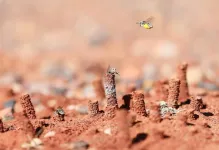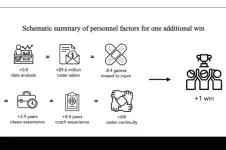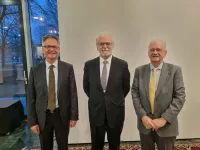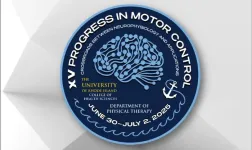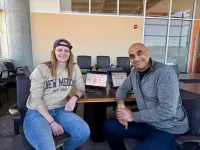(Press-News.org) Until the 1990s, Venezuela was home to one of the most established democracies in Latin America. Today, however, it stands as one of the region’s most firmly entrenched authoritarian regimes.
How did this shift occur, and what can other countries learn from Venezuela’s transformation?
A new paper from political scientist Laura Gamboa at the University of Notre Dame chronicles the country’s 25-year evolution, during which Hugo Chávez and his successor, Nicolás Maduro, destroyed a system of checks and balances, ended competitive elections, terminated political rights and civil liberties, and harmed or killed scores of political opponents along the way.
“The Venezuelan case provides several lessons for countries whose democracies are just beginning to erode,” Gamboa said. “It shows that you should use all of the institutional spaces you have while you have them. Not leveraging those spaces is a mistake.”
How Hugo Chávez seized power
Venezuela’s democracy began to erode in 1999, when newly elected President Hugo Chávez convened a constitutional assembly to draft a new constitution for the country — a power grab that was carried out without the approval of the National Congress.
Yet even after this power grab, the anti-Chavista coalition still controlled media outlets, exerted influence over the armed forces and the state-owned oil company, held seats in the legislature, received support from courts and oversight agencies, and had the ability to mobilize Venezuelans into the streets. Despite a significant presence within democratic institutions, the opposition chose instead to resist the erosion of democracy through radical strategies: a 2002 coup and the 2003 oil strike to push Chávez to resign.
These strategies cost the opposition important bureaucratic and state resources because they gave Chávez the reason he needed to purge the military, fire oil company managers, and use oil revenues to buy domestic and international support, Gamboa said.
“Using tactics like coups, boycotts or strikes can be effective ways to protest a government, but they can backfire when you leverage them against a popular and democratically elected president.”
By 2006, the anti-Chavista coalition had lost most of the institutional resources that had previously been available, such as an independent media, and Chávez had asserted more power by appointing loyalists to oversight agencies and the country’s courts. And yet, the opposition won back some elected offices in 2008 and 2015 and was able to use those elected offices to highlight some government abuses.
“We see from these successes that when you use institutions, there can be a good payoff,” Gamboa said.
Opposing Nicolás Maduro
Gamboa’s analysis showed that in recent years, even operating amid tight constraints, the opposition movement created opportunities to push against autocratization — for example, through Venezuela’s 2024 presidential elections. Though incumbent Nicolás Maduro declared victory amid widespread accusations of fraud, and despite several countries — including the U.S. — denouncing official results, opposition leader María Corina Machado announced that tallies from more than 70 percent of the country’s voting stations showed that Maduro’s opponent, Edmundo González, had received 3.5 million more votes than the president.
“No one expected Venezuela to have elections,” Gamboa said. “The opposition competed even though their ability to compete was diminished, and they won even though the odds of winning were very small. Yes, the regime clamped down, but it’s significant that the opposition was able to express itself in an electoral space.”
While the 2024 election results suggest that winning an electoral contest is possible in a highly authoritarian environment, Gamboa said, an election win is not enough to guarantee a transition to democracy.
“If the opposition chose to leverage both institutional and non-institutional strategies and use them together, that would probably be more powerful,” she said.
The author of “Resisting Backsliding: Opposition Strategies Against the Erosion of Democracy,” Gamboa has studied Venezuela since 2013. Her new study, published in a special issue of the Annals of the American Academy of Political and Social Science on democratic erosion, was informed by extensive fieldwork that included interviews and archival research.
Overall, Gamboa said, the case of Venezuela shows that democratic backsliding is a highly uncertain process, and more research on newer forms of autocratization and opposition strategies is needed. She is currently working on a book related to these issues, focusing on how regime type affects opposition strategies and their effectiveness.
“In the past two decades, we have seen a significant decline in democracy across the world,” she said. “Democracies have eroded into authoritarian regimes, and formerly weak autocracies have become more entrenched. For opposition movements in both of these cases, Venezuela offers lessons and hope.”
Contact: Tracy DeStazio, associate director of media relations, 574-631-9958 or tdestazi@nd.edu
END
Lessons from Venezuela’s democratic collapse: How opposition movements can defy autocratic leaders
By Renée LaReau
2025-03-25
ELSE PRESS RELEASES FROM THIS DATE:
USU ecologists document Utah's bee species and say beehive state is rich in bee diversity
2025-03-25
TOOELE, UTAH, USA -- Wildlife conservation is critical to sustaining the planet’s biodiversity and health. But putting together a conservation plan is a tall order. First of all, you need to determine what species you’re conserving, along with their numbers, habitat needs, threats and how they fit into a complex ecosystem.
As pollinators for native plants and food crops, bees play a pivotal role in our ecosystem, according to Utah State University ecologist Joseph Wilson. He and undergraduate researcher Anthony Hunsaker took on the herculean task of documenting Utah’s bee species using online occurrence records from the Symbiota Collection of Arthropods ...
A hit of dopamine tells baby birds when their song practice is paying off
2025-03-25
DURHAM, N.C. -- In his home office in Durham, Duke neuroscientist Richard Mooney shows a series of images of a bird’s brain on song.
In one, what looks like a pointillist painting illustrates a young zebra finch’s myriad attempts to sound more like an adult, capable of wooing a mate. In another, squiggly lines trace the ebb and flow of chemical signals in the reward circuit of the bird’s brain.
“Their songs don’t sound like much at first,” said Mooney, who has studied birdsong for four decades.
That’s because some things take considerable practice to master. Nobody walks onto a tennis court for the first time and plays ...
Basketball analytics investment is key to NBA wins and other successes
2025-03-25
If you filled out a March Madness bracket this month, you probably faced the same question with each college match-up: What gives one team an edge over another? Is it a team’s record through the regular season? Or the chemistry among its players? Maybe it’s the experience of its coaching staff or the buzz around a top scorer.
All of these factors play some role in a team’s chance to advance. But according to a new study by MIT researchers, there’s one member who consistently ...
Scientific cooperation is strategic for Brazil to strengthen relations with Europe
2025-03-25
Relations between Europe and South America – and especially with Brazil - are at a favorable moment, due to factors such as the free trade agreement between Mercosur and the European Union, signed in December 2024 and currently being approved. However, in order to take advantage of this window of opportunity and be competitive, Brazil must continue to expand scientific and technological cooperation with European partners.
This assessment was made by the Brazilian Ambassador to Germany, Roberto Jaguaribe, ...
Engineering antibodies with a novel fusion protein
2025-03-25
The Food and Drug Administration has approved more than 100 monoclonal antibodies to treat a range of diseases. Other antibodies are used by physicians to diagnose conditions or by scientists to advance research projects.
Even with significant expansion in the global market for antibodies used in clinical care and research, scientists recognize that there is still untapped potential for finding new antibodies. Many proteins group together in what are called protein complexes to carry out biological functions. The traditional method of generating antibodies by immunizing animals struggles to make antibodies related to these protein complexes.
The conventional ...
Transforming cardiovascular care through upfront combination therapy
2025-03-25
NEW ORLEANS - Ochsner Health Medical Director for Cardiac Rehabilitation and Preventive Cardiology, Carl J. “Chip” Lavie, Jr., MD, recently co-authored a groundbreaking research study featured in the prestigious Mayo Clinic Proceedings highlighting the comparative efficacy of lipid-lowering therapies for reducing cardiovascular risks and led by Maciej Banach, MD,PhD from Poland and leader of the International Lipid Expert Panel ( ILEP). Impact of Lipid-Lowering Combination Therapy With Statins ...
URI to host international XV Progress in Motor Control Conference
2025-03-25
Scientists from around the world specializing in motor control and neuroscience will travel to the University of Rhode Island this summer as the university hosts the international XV Progress in Motor Control Conference.
The university’s Department of Physical Therapy, its George & Anne Ryan Institute for Neuroscience, and the Interdisciplinary Neuroscience Program at URI, will host the biennial meeting of the International Society of Motor Control (ISMC) June 30 to July 2. This year’s conference will be held in the Center for ...
How Zika virus knocks out our immune defenses
2025-03-25
LA JOLLA, CA—Zika virus and dengue virus are very close relatives. Both are mosquito-borne flaviviruses, and both specialize in infecting a host's dendritic cells.
But a new Nature Communications study, led by scientists at La Jolla Institute for Immunology (LJI) and UC San Diego shows that these two viruses have vastly different ways of making us sick.
Zika virus uses stealth. Zika virus slips into dendritic cells and blocks the dendritic cells from alerting nearby T cells to danger. It's the classic horror movie cliche—the creeper is already in the house, and ...
Could an arthritis drug unlock lasting relief from epilepsy and seizures? UW–Madison researchers see promising results in mice
2025-03-25
MADISON — A drug typically prescribed for arthritis halts brain-damaging seizures in mice that have a condition like epilepsy, according to researchers at the University of Wisconsin–Madison.
The drug, called tofacitinib, also restores short-term and working memory lost to epilepsy in the mice and reduces inflammation in the brain caused by the disease. If the drug proves viable for human patients, it would be the first to provide lasting relief from seizures even after they stopped taking it.
“It ticks all the boxes ...
SCAI announces 2025-26 recipients of JSCAI Editorial Fellowship Program
2025-03-25
SCAI Announces 2025-26 Recipients of JSCAI Editorial Fellowship Program
WASHINGTON — The Society for Cardiovascular Angiography & Interventions (SCAI) is pleased to announce the selection of 10 outstanding early-career interventional cardiologists for the 2025-26 JSCAI Editorial Fellowship Program cohort.
The JSCAI Editorial Fellowship Program provides fellows-in-training and early-career interventionalists with a unique opportunity to develop their skills as peer reviewers and gain firsthand experience in the editorial process. Participants are paired with JSCAI Deputy or Associate ...
LAST 30 PRESS RELEASES:
How periodontitis-linked bacteria accelerate osteoporosis-like bone loss through the gut
Understanding how cells take up and use isolated ‘powerhouses’ to restore energy function
Ten-point plan to deliver climate education unveiled by experts
Team led by UC San Diego researchers selected for prestigious global cancer prize
Study: Reported crop yield gains from breeding may be overstated
Stem cells from human baby teeth show promise for treating cerebral palsy
Chimps’ love for crystals could help us understand our own ancestors’ fascination with these stones
Vaginal estrogen therapy not linked to cancer recurrence in survivors of endometrial cancer
How estrogen helps protect women from high blood pressure
Breaking the efficiency barrier: Researchers propose multi-stage solar system to harness the full spectrum
A new name, a new beginning: Building a green energy future together
From algorithms to atoms: How artificial intelligence is accelerating the discovery of next-generation energy materials
Loneliness linked to fear of embarrassment: teen research
New MOH–NUS Fellowship launched to strengthen everyday ethics in Singapore’s healthcare sector
Sungkyunkwan University researchers develop next-generation transparent electrode without rare metal indium
What's going on inside quantum computers?: New method simplifies process tomography
This ancient plant-eater had a twisted jaw and sideways-facing teeth
Jackdaw chicks listen to adults to learn about predators
Toxic algal bloom has taken a heavy toll on mental health
Beyond silicon: SKKU team presents Indium Selenide roadmap for ultra-low-power AI and quantum computing
Sugar comforts newborn babies during painful procedures
Pollen exposure linked to poorer exam results taken at the end of secondary school
7 hours 18 mins may be optimal sleep length for avoiding type 2 diabetes precursor
Around 6 deaths a year linked to clubbing in the UK
Children’s development set back years by Covid lockdowns, study reveals
Four decades of data give unique insight into the Sun’s inner life
Urban trees can absorb more CO₂ than cars emit during summer
Fund for Science and Technology awards $15 million to Scripps Oceanography
New NIH grant advances Lupus protein research
New farm-scale biochar system could cut agricultural emissions by 75 percent while removing carbon from the atmosphere
[Press-News.org] Lessons from Venezuela’s democratic collapse: How opposition movements can defy autocratic leadersBy Renée LaReau

